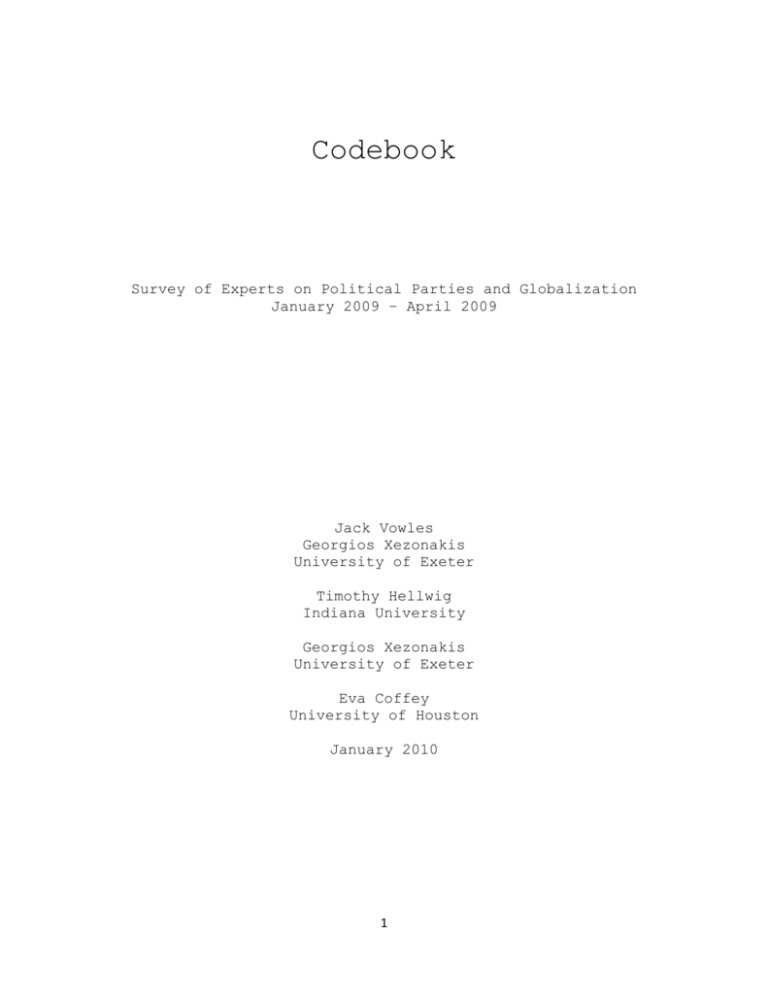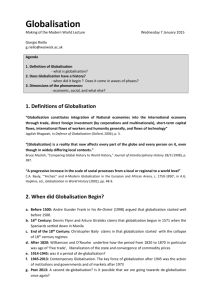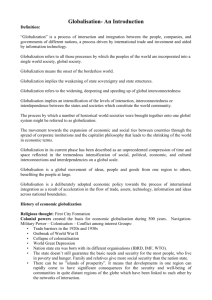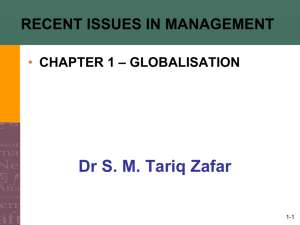Codebook - Jack Vowles
advertisement

Codebook Survey of Experts on Political Parties and Globalization January 2009 – April 2009 Jack Vowles Georgios Xezonakis University of Exeter Timothy Hellwig Indiana University Georgios Xezonakis University of Exeter Eva Coffey University of Houston January 2010 1 Note: This codebook corresponds to the datafile experts_130111.dta. Cases in the datafile are organized at the level of “party-dimension” which corresponds to party-specific questions asked of experts covering 301 parties from 39 countries (see variable “DIMENSION”). These expert survey data were collected from January-April 2009. Values for all other variables, measured at the party- or country-level entered in repeated rows as necessary to match up with the “DIMENSION” variable. COUNTRYID Unique identifier for each country. Country name Country ID Australia 2 Austria 3 Belgium 4 Brazil 5 Bulgaria 6 Canada 7 Chile 8 Czech Republic 9 Denmark 10 Estonia 11 Finland 12 France 13 Germany 14 Greece 15 Hungary 16 Iceland 17 Ireland 18 Israel 19 Italy 20 Japan 21 Korea 22 Latvia 23 Lithuania 24 Mexico 25 Netherlands 26 New Zealand 27 Norway 28 Poland 29 Portugal 30 Romania 31 Slovakia 32 Slovenia 33 2 Spain 34 Sweden 35 Switzerland 36 Taiwan 37 Turkey 38 UK 39 USA 40 PARTYNAME Name of a party. Country Australia Party name "Liberal Party of Australia (LPA)" "National Party of Australia (NP)" "Australian Labour Party (ALP)" "Australian Greens" "Family First Party" "Australian Democrats (AD)" "One Nation Party (ON)" "Christian Democrats" Austria "Sozialdemokratische Partei Österreichs (SPÖ)" "Österreichische Volkspartei (ÖVP)" "Freiheitliche Partei Österreichs (FPÖ)" "Bündnis Zukunft Österreich (BZÖ)" "Die Grünen" "Liberales Forum (LIF)" 301 302 303 304 305 306 "Christen-Democratisch & Vlaams/Nieuw-Vlaams Alliantie (CD&V/NV-A)" "Mouvement Réformateur (MR)" "Vlaams Belang (VB)" 401 402 403 "Open Vlaamse Liberalen en Democraten (Open VLD)" "Parti Socialiste (PS)" "Sociaal Progressief Alternatief (SP.a-SPIRIT)" "Centre Démocrate Humaniste (CDH)" "Ecolo" "Lijst De Decker (LDD)" "Groen!" "Front National (FN)" 404 405 406 407 408 409 410 411 "Partido "Partido "Partido "Partido "Partido 501 502 503 504 505 Belgium Brazil dos Trabalhadores" do Movimento Democrático Brasileiro" da Social-Democracia Brasileira" da Frente Liberal" Progressista" 3 Code 201 202 203 204 205 206 207 208 "Partido "Partido "Partido "Partido "Partido Socialista Brasileiro" Democrático Trabalhista" Trabalhista Brasileiro" Liberal" Popular Socialista" 506 507 508 509 510 Bulgaria "Bălgarska Socialističeska Partija" "Nacionalno dviženie za stabilnost i vǎzhod" "Dviženie za Prava i Svobodi" "Nacionalno Obedinenie Ataka" "Obedineni demokratični sili" "Demokrati za Silna Bălgarija" "Bălgarski Naroden Săjuz" 601 602 603 604 605 606 607 Canada "Liberal Party of Canada (LP)" "Conservative Party of Canada (CP)" "New Democratic Party (NDP)" "Bloc Quebecois (BQ)" "Green Party (G)" 701 702 703 704 705 Chile "Partido Demócrata Cristiano" "Partido por la Democracia" "Partido Socialista de Chile" "Partido Radical Socialdemócrata" "Unión Demócrata Independiente" "Renovación Nacional" "Partido Comunista de Chile" 801 802 803 804 805 806 807 Czech Republic "Občanská demokratická strana (ODS)" "Česká strana sociálně demokratická (CSSD)" "Komunistická strana Čech a Moravy (KSCM)" 901 902 903 "Křest'anská a demokratická unie-Československá strana lidová (KDU-ČSL)" "Strana zelených (SZ)" "SNK Evropští demokraté" 904 905 906 Denmark "Venstre (V)" "Socialdemokratiet (S)" "Dansk Folkeparti (DF)" "Det Konservative Folkeparti (KF)" "Det Radikale Venstre (RV)" "Socialistisk Folkeparti (SF)" "Enhedslisten (Ø)" "Liberal Alliance" 1001 1002 1003 1004 1005 1006 1007 1008 Estonia "Reformierakond (RE)" "Keskerakond (KeE)" 1101 1102 4 "Isamaa ja Res Publica Liit (IRL)" "Sotsiaaldemokraatlik Erakond (SDE)" "Eestimaa Rohelised" "Eestimaa Rahvaliit (RL)" 1103 1104 1105 1106 Finland "Suomen Keskusta (KESK)" "Kansallinen Kokoomus (KOK)" "Sosialidemokraattinen Puolue (SDP)" "Vasemmistoliitto (VAS)" "Vihreät (VIHR)" "Svenska Folkpartiet (SFP)" "Kristillisdemokraatit (KD)" "Perussuomalaiset (PS)" 1201 1202 1203 1204 1205 1206 1207 1208 France "Union pour un mouvement populaire (UMP)" "Parti Socialiste (PS)" "Parti communiste français (PCF)" "Mouvement démocrate (MoDem)" "Front national (FN)" "Les Verts" "Parti Radical de Gauche (PRG)" 1301 1302 1303 1304 1305 1306 1307 Germany "Sozialdemokratische Partei Deutschlands (SPD)" "Christlich Demokratische Union (CDU)" "Christlich-Soziale Union (CSU)" "Bündnis 90/Die Grünen" "Freie Demokratische Partei(FDP)" "Die Linke" "Die Republikaner (REP)" 1401 1402 1403 1404 1405 1406 1407 "Nationaldemokratische Partei Deutschlands (NPD)" 1408 Greece "Nea Dimokratia (N.D)" "Panellinio Sosialistiko Kinima (PASOK)" "Komounistiko Komma Elladas (KKE)" "Synaspismos Rizospastikis Aristeras (SYRIZA)" "Laikos Orthodoksos Synagermos (ΛΑ.Ο.Σ.)" 1501 1502 1503 1504 1505 Hungary "Magyar Szocialista Párt (MSZP)" "Szabad Demokraták Szövetsége (SZDSZ)" "Fidesz – Magyar Polgári Szövetség" "Kereszténydemokrata Néppárt (KDNP)" "Magyar Demokrata Fórum (MDF)" "Magyar Igazság és Élet Pártja" "Jobbik Magyarországért Mozgalom" "Somogyért" 1601 1602 1603 1604 1605 1606 1607 1608 Iceland "Sjálfstæðisflokkurinn" 1701 5 "Samfylkingin" "Vinstrihreyfingin – grænt framboð" "Framsóknarflokkurinn" "Frjálslyndi flokkurinn" "Íslandshreyfingin – lifandi land" 1702 1703 1704 1705 1706 Ireland "Fianna Fáil" "Fine Gael" "Labour" "Sinn Féin" "Green Party" "Progressive Democrats" 1801 1802 1803 1804 1805 1806 Israel "Kadima" "Likud" "Israeli Labour Party" "Yisrael Beiteinu" "Shas" "Hadash" "Torah Judaism" "National Union" "United Arab List-Ta'al" "Meretz" "Habayit Hayehudi" "Balad" "Meimad" 1901 1902 1903 1904 1905 1906 1907 1908 1909 1910 1911 1912 1913 Italy "Il Popolo della Libertà (PdL)" "Partito Democratico (PD)" "Lega Nord (LN)" "Unione di Centro (UdC)" "Italia dei Valori (IdV)" "Partito della Rifondazione Comunista (PRC)" "Partito dei Comunisti Italiani" "Federazione dei Verdi" "La Destra" "Fiamma Tricolore" 2001 2002 2003 2004 2005 2006 2007 2008 2009 2010 Japan "Jiyū Minshutō" "Minshutō" "Kōmeitō" "Nihon Kyōsantō" "Shakai Minshutō" "Kokumin Shintō" "Shintō Nippon" 2101 2102 2103 2104 2105 2106 2107 Korea "Hannara-dang - Grand National Party" "Minju-dang - Democratic Party" 2201 2202 6 Latvia Lithuania Mexico Netherlands "Jayu Seonjin-dang - Liberty Forward Party" "Chinbak Yeondae - Pro-Park Alliance" "Minju-Nodong-dang - Democratic Labor Party" "Changjo Hanguk-dang - Renewal of Korea Party" 2203 2204 2205 2206 "Chinbak Musosok Yeondae- Solidarity for Pro-Park Independents" 2207 "Tautas partija (TP)" "Zaļo un Zemnieku Savienība, abbreviated (ZZS)" "Jaunais Laiks (JL)" "Tautas Saskaņas Partija (TSP)" "Latvijas Sociālistiskā partija (LSP)" "Latvijas Pirmā partija (LPP)" "Latvijas Ceļš (LC)" "Tēvzemei un Brīvībai/LNNK" "Par cilvēka tiesībām vienotā Latvijā (PCVTL)" 2301 2302 2303 2304 2305 2306 2307 2308 2309 "Latvijas Sociāldemokrātiskā Strādnieku Partija (LSDSP)" 2310 "Tėvynės sąjunga – Lietuvos krikscionys demokratai (TS-LKD)" "Lietuvos socialdemokratų partija (LSDP)" "Tautos prisikėlimo partija" "Tvarka ir teisingumas" "Lietuvos Respublikos Liberalų sąjūdis (LRLS)" "Darbo Partija (DP)" "Liberalų ir centro sąjunga (LiCS)" 2401 2402 2403 2404 2405 2406 2407 "Lietuvos lenkų rinkimų akcija/ Akcja Wyborcza Polaków na Litwie (AWPL)" "Lietuvos valstiečių liaudininkų sąjunga (LVLS)" "Naujoji sąjunga (NS)" 2408 2409 2410 "Partido Acción Nacional (PAN)" "Partido de la Revolución Democrática (PRD)" "Convergencia" "Partido del Trabajo (PT)" "Partido Revolucionario Institucional (PRI)" "Partido Verde Ecologista de México (PVEM)" "Partido Nueva Alianza (PNA)" 2501 2502 2503 2504 2505 2506 2507 "Partido Alternativa Socialdemócrata y Campesina (PSD)" 2508 "Christen-Democratisch Appèl (CDA)" "Partij van de Arbeid (PvdA)" "Socialistische Partij (SP)" "Volkspartij voor Vrijheid en Democratie (VVD)" "Partij voor de Vrijheid (PVV)" GroenLinks (GL)" 2601 2602 2603 2604 2605 2606 7 "ChristenUnie (CU) "Democraten 66 (D66)" "Staatkundig Gereformeerde Partij (SGP)" "Partij voor de Dieren (PVD)2 2607 2608 2609 2610 New Zealand "Labour Party (LP)" "National Party (NP)" "New Zealand First Party (NZFP)" "Green Party of Aotearoa (GPA)" "Maori Party" "United Future New Zealand (UFNZ)" "ACT New Zealand" "Jim Anderton's Progressive Coalition" 2701 2702 2703 2704 2705 2706 2707 2708 Norway "Det norske arbeiderparti (DNA)" "Fremskrittspartiet (FrP)" "Høyre (H)" "Sosialistisk Venstreparti (SV)" "Kristelig Folkeparti(KrF)" "Senterpartiet (Sp)" "Venstre (V)" "Rødt" 2801 2802 2803 2804 2805 2806 2807 2808 Poland "Platforma Obywatelska (PO)" "Prawo i Sprawiedliwość (PiS)" "Lewica i Demokraci (LiD)" "Polskie Stronnictwo Ludowe (PSL)" "Samoobrona Rzeczpospolitej Polskiej (SRP)" "Liga Polskich Rodzin (LPR)" 2901 2902 2903 2904 2905 2906 Portugal "Partido "Partido "Partido "Partido Socialista (PS)" Social Democrata (PSD)" Comunista Português (PCP)" Ecologista "Os Verdes" (PEV)" 3001 3002 3003 3004 "Centro Democrático e Social - Partido Popular (CDS-PP)" "Bloco de Esquerda (BE)" 3005 3006 "Partidul "Partidul "Partidul "Partidul 3101 3102 3103 3104 Romania Democrat-Liberal (PD-L)" Social Democrat (PSD)" Conservator (PC)" Naţional Liberal (PNL)" "Partidul Naţional Ţărănesc Creştin Democrat (PNŢ-CD)" "Uniunea Democrată Maghiară din România (UDMR)" "Partidul România Mare (PRM)" 3105 3106 3107 "Partidul Noua Generaţie - Creştin Democrat (PNGCD)" 3108 8 Slovakia "Smer – sociálna demokracia" 3201 "Slovenská demokratická a kresťanská únia – Demokratická strana (SDKÚ-DS)" "Slovenská národná strana (SNS)" 3202 3203 "Strana maďarskej koalície - Magyar Koalíció Pártja" 3204 "Ľudová strana – Hnutie za demokratické Slovensko (LS-HZDS)" "Kresťanskodemokratické hnutie (KDH)" "Komunistická strana Slovenska (KSS)" "Slobodné fórum" 3205 3206 3207 3208 "Socialni demokrati (SD)" "Slovenska demokratska stranka (SDS)" "Zares" 3301 3302 3303 "Demokraticna stranka upokojencev Slovenije (DeSUS)" "Slovenska nacionalna stranka (SNS)" "Slovenska ljudska stranka (SLS)" "Liberalna demokracija Slovenije (LDS)" "Stranka mladih Slovenije (SMS)" "Nova Slovenija (NSi)" 3304 3305 3306 3307 3308 3309 "Partido Socialista Obrero Español (PSOE)" "Partido Popular (PP)" "Convergència i Unió (CiU)" 3401 3402 3403 "Partido Nacionalista Vasco/Euzko Alderdi Jeltzalea (EAJ-PNV)" "Esquerra Republicana de Catalunya (ERC)" "Izquierda Unida (IU)" "Bloque Nacionalista Galego (BNG)" "Coalición Canaria" "Unión, Progreso y Democracia (UpyD)" 3404 3405 3406 3407 3408 3409 Sweden "Sveriges socialdemokratiska arbetareparti (S)" "Moderata samlingspartiet (M)" "Vänsterpartiet (V)" "Miljöpartiet de Gröna (MP)" "Folkpartiet Liberalerna (FP)" "Kristdemokraterna (KD)2 "Centerpartiet ©" 3501 3502 3503 3504 3505 3506 3507 Switzerland "Schweizerische Volkspartei (SVP/UDC)" "Sozialdemokratische Partei der Schweiz (SP/PS)" 3601 3602 "Freisinnig-Demokratische Partei der Schweiz (FDP/PRD)" "Christlich Demokratische Volkspartei (CVP/PDC)" 3603 3604 Slovenia Spain 9 "Grüne Partei der Schweiz (GPS/PES)" "Liberale Partei der Schweiz (LPS/PLS)" "Grünliberale Partei der Schweiz (GLP/VL)" "Evangelische Volkspartei der Schweiz (EVP/PEP)" "Eidgenössisch-Demokratische Union" "Partei der Arbeit der Schweiz (PdA/PST-POP)" "Lega dei Ticinesi (LdT)" "Christlich-soziale Partei (CSP/PCS)" 3605 3606 3607 3608 3609 3610 3611 3612 Taiwan "Kuomintang (KMT)" "Democratic Progressive Party (DPP)" "People First Party (PFP)" "Non-Partisan Solidarity Union" "Taiwan Solidarity Union (TSU)" "New Party" 3701 3702 3703 3704 3705 3706 Turkey "Adalet ve Kalkınma Partisi (AKP)" "Cumhuriyet Halk Partisi (CHP)" "Milliyetçi Hareket Partisi (MHP)" "Demokrat Parti (DP)" "Genç Parti (GP)" "Saadet Partisi (SP)" "Anavatan Partisi (ANAVATAN)" "Demokratik Toplum Partisi (DTP)" 3801 3802 3803 3804 3805 3806 3807 3808 UK "Labour Party" "Conservative Party" "Liberal Democrats" "Scottish National Party" "Democratic Unionist Party" "Plaid Cymru" "UK Independence Party" 3901 3902 3903 3904 3905 3906 3907 USA "Republican Party" "Democratic Party" 4001 4002 DIMENSION This variable includes a total of 14 dimensions of analysis of each individual party. Values 1 through 14 correspond to the following dimensions: 1. Left-right: dimension reflecting the broad ideology of the party leadership. Respondents were presented a set of parties relevant for the country they specialize in and they were asked the following question: “We would like to start by asking you to characterize the parties in terms of their broad ideological stances on a general leftright dimension. On the scale below, 0 indicates that a party is at the extreme left of the ideological spectrum, 10 indicates that it is at the extreme right, and 5 means that it is at the centre. Please 10 indicate the location of each party on a general left-right dimension, taking all aspects of party policy into account.” 2. Social: dimension measuring party leadership position on social policy. Respondents were asked, “Another way parties are sometimes classified is in terms of their views on social policy. Some parties favour liberal policies on matters such as abortion, homosexuality, and euthanasia. Other parties oppose these policies. Others are located somewhere between these extremes. Using these criteria, on the scale below please indicate where the parties are located on questions of social policy, where 0 indicates strong preferences in favour of liberal policies on matters like abortion, homosexuality, and euthanasia and 10 indicates strong opposition to these policies.“ 3. Immigration: dimension reflecting party leadership position on immigration and asylum. The question was worded, “Next consider the issue of immigration. Some political parties favour policies designed to help immigrants and asylum seekers integrate into the [Country] society. Other parties favour policies designed to help immigrants and asylum seekers return to their country of origin. Still others are located somewhere between these extremes. Using these criteria, please indicate where the parties are located on questions of immigration policy, where 0 indicates strong preferences for helping immigrants and asylum seekers integrate into society and 10 indicates strong preferences for helping immigrants and asylum seekers return to their country of origin.” 4. Trade: measures party leadership position on trade, with the question worded, “Next consider positions on the international economy. Some parties are strong supporters of free trade as a means to increase exports and consumer choice. Other parties favour protectionist policies to protect national industry. Others lie somewhere in the middle of these views. For each party, please tick the number that corresponds to the statement that, in your mind, best describes the position toward free trade that the party’s leadership has taken over the course of 2008, where 0 indicates that party is strongly in favour of protectionism and 10 indicates that party is strongly in favour of free trade. Please, tick only one number.” 5. Tax-Spend (Before): reflects party leadership position on taxes versus spending at the beginning of 2008. Respondents were asked, “Next we would like to ask you about fiscal policy. Some political parties feel it is important for the government to provide many more services even if it means an increase in spending. Other parties think the government should provide fewer services even in areas such as health and education in order to reduce spending. Still others are located somewhere between these extremes. Using these criteria, please indicate where the parties were located at the beginning of 2008 on questions of tax and spend, where 0 indicates strong preferences for raising taxes and increasing spending on services and 10 indicates strong preferences for cutting taxes and spending less on services.” 6. Tax-Spend (After): reflects leadership party position on taxes versus spending at the end of 2008 with the question, “Some parties may have changed their position on fiscal policy during the course of 2008. 11 Below, please indicate where the parties were located at the end of 2008 on questions of tax and spend.” 7. Privatisation (Before): measures party leadership position on the government’s role in the economy at the beginning of 2008. The question was worded, “Next, we would like to ask you about the government’s role in the economy. Some parties favour granting broad capacity to the government to regulate and even own business and industry. Other parties oppose regulation and nationalisation and instead favour the free market and private ownership of industry. Still others are located somewhere between these extremes. Using these criteria, please indicate where the parties were located at the beginning of 2008 on questions of government involvement in the economy, where 0 indicates strong preferences for nationalisation and regulation and 10 indicates strong preferences for privatisation and free market economics.” 8. Privatisation (After): measures party leadership position on the government’s role in the economy at the end of 2008. Respondents were asked, “Some parties may have changed their position on the government’s role in the economy during the course of 2008. Below, please indicate where the parties were located at the end of 2008 on questions of the government’s role in the economy.” 9. Government Constraint: assesses party leadership’s opinion about the governemtn’s room to maneuver due to globalization, with the following question: “Opinions differ in terms of the connection between economic globalisation and policymaking in individual countries. Thinking in terms of each political party, is globalisation of the economy believed to leave the [Country] government with 1. a great deal, 2. quite a lot, 3. not very much, or 4. hardly any room to make its own decisions about its economic policies (4 point scale)? Please tick the answer that corresponds to the view of each party.” 10. Coordination- Regulation: dimension measuring the party leadership’s position toward international coordination or national regulation. Respondents were asked, “In the aftermath of the recent international financial crisis, some have advocated greater international coordination in financial regulation, while others have advocated that each country reform its own regulatory structures. Still others are located somewhere between these extremes. For each party, please tick the number that corresponds to the statement that, in your mind, best describes its position toward international coordination or national regulation in the aftermath of the international financial crisis where 0 indicates that party is strongly in favour of national regulation and 10 indicates party is strongly in favour of international coordination.” 11. Globalisation (Before): assesses party leadership's overall orientation toward globalization at the beginning of 2008. Respondents were asked, “In your opinion, what is the overall orientation of each political party toward the consequences of globalisation? For each party, please tick the number that corresponds to the statement that, in your mind, best describes its overall orientation toward the consequences of globalisation at the beginning of 2008, where 0 indicates strongly opposed to economic globalisation and 10 indicates strongly in favour of economic globalization.” 12 12. Globalisation (After): assesses party leadership's overall orientation toward globalization at the end of 2008. Respondents were asked, “Some parties may have changed their position on the consequences of globalisation during the course of 2008. Below, please indicate where the parties were located at the end of 2008 on the issue of globalisation.” 13. Dissent: dimension assessing the level of dissent within each party about globalization, with the question worded, “How much internal dissent has there been in the various political parties in [Country] on the issue of globalisation of the economy in 2008? 1. Complete unity, 2. Minor dissent, 3. Significant dissent, 4. Party evenly split on issue, 5. Leadership position opposed by a majority of party activists (5 point scale). Please tick one response for each party listed.” 14. Globalisation Salience: dimension measuring the salience of globalization for political parties. Respondents were asked, “Next, we would like you to think about the salience of globalisation to the political parties in [Country]. During 2008, how important has the world economy been to the parties in their public stance? 1. Globalization is of no importance at all, 2. Globalization is of little importance, 3. Globalization is of some importance, 4. Globalization is of great importance.” Please, tick the appropriate response for each party.” MEAN Mean value of expert responses for each party on the dimension. SD Standard deviation value of expert responses for each party on the dimension. N The number of experts providing a response for each question. “don’t know” responses. Excludes GLDB1 Country-level variable measuring the salience of globalization in political debate at the beginning of 2008. Respondents were asked, “In this section we would like to ask you about economic globalisation, defined as the free movement of goods, people, and services across national borders. In your own opinion, to what extent was the issue of globalisation part of mainstream political debate in [Country] at the beginning of 2008? Was it: 1.a major issue, 2.an issue raised from time to time, 3.an issue occasionally mentioned, or 4.an issue mentioned hardly at all?” (4 point scale). Measure is the mean value provided by experts for country. GLDB2 Country-level variable measuring the salience of globalization in political debate at the end of 2008. Respondents were asked, “And what about the issue of globalisation in political debate at the end of 2008? Was it: 0. Same as the beginning of 2008, 1. a major issue, 2.an issue raised from time to time, 3.an issue occasionally mentioned, or 4.an issue mentioned hardly at all? (4 point scale) (Please tick the first box if the importance of the issue has remained the same).” Measure is the mean value provided by experts for country. 13 BUSAL1 Variable assessing the salience of globalization to the business community at the beginning of 2008. The question was worded, “What about the salience of economic globalisation to the business community in [Country]? How important has economic globalisation been to the business community in its planning and strategy at the beginning of 2008? 1. Globalization was of no importance at all, 2. Globalization was of little importance, 3. Globalization was of some importance, 4. Globalization was of great importance (4 point scale).” Measure is the mean value provided by experts for country. BUSAL2 Variable assessing the salience of globalization to the business community at the end of 2008. The question was worded, “What about the salience of economic globalisation to the business community in [Country]? How important has economic globalisation been to the business community in its planning and strategy at the end of 2008? 1. Globalization is of no importance at all, 2. Globalization is of little importance, 3. Globalization is of some importance, 4. Globalization is of great importance (4 point scale)” Measure is the mean value provided by experts for country. UNSAL1 Variable indicating the salience of globalization to trade unions at the beginning of 2008. Respondents were asked, “And finally what about the salience of economic globalisation to the trade union movement in [Country]? How important has economic globalisation been to unions in their planning and strategy at the beginning of 2008? 1. Globalization was of no importance at all, 2. Globalization was of little importance, 3. Globalization was of some importance, 4. Globalization was of great importance (4 point scale).” Measure is the mean value provided by experts for country. UNSAL2 Variable indicating the salience of globalization to trade unions at the end of 2008. Respondents were asked, “And finally what about the salience of economic globalisation to the trade union movement in [Country]? How important has economic globalisation been to unions in their planning and strategy at the end of 2008? 1. Globalization is of no importance at all, 2. Globalization is of little importance, 3. Globalization is of some importance, 4. Globalization is of great importance (4 point scale).” Measure is the mean value provided by experts for country. GLDB1SD Standard deviation of GLDB1. GLDB2SD Standard deviation of GLDB2. BUSAL1S Standard deviation of BUSAL1. BUSAL2S Standard deviation of BUSAL2. UNSAL1S Standard deviation of UNSAL1. UNSAL2S 14 Standard deviation of UNSAL2. ELECDATE Date of election. VOTESHARE Share of votes a party received during election. Source: Official election Web sites and statistical offices of individual parties; http://www.parties-and-elections.de (for results in Europe); Adam Carr’s Election Archive (http://psephos.adam-carr.net/); Chronicle of parliamentary elections, volume 41 and 42; http://www.terra.es/personal2/monolith/00europa.htm NOOFSEATS Number of seats a party received after election in the legislature. Source: Official election Web sites and statistical offices of individual parties; http://www.parties-and-elections.de (for results in Europe); Adam Carr’s Election Archive (http://psephos.adam-carr.net/); Chronicle of parliamentary elections, volume 41 and 42; http://www.terra.es/personal2/monolith/00europa.htm SEATSHARE Share of seats a party received after election in the legislature. Source: Official election Web sites and statistical offices of individual parties; http://www.parties-and-elections.de (for results in Europe); Adam Carr’s Election Archive (http://psephos.adam-carr.net/); Chronicle of parliamentary elections, volume 41 and 42; http://www.terra.es/personal2/monolith/00europa.htm PARTYINGOV Dummy variable indicating the participation of the party in the government as of December 31, 2008 (parties in government coded 1, otherwise 0). Note: In the majority of presidential systems, the party in government is considered the one supporting the elected president, except of Chile where the elected president was supported by a coalition of parties. Source: Parline database on national parliaments, http://www.ipu.org/parlinee/parlinesearch.asp; http://www.parties-and-elections.de; International Media: BBC World, Reuters EXECPARTY Dummy variable indicating party as chief executive as of December 31, 2008. For parliamentary and semi-parliamentary regimes this is the party of the prime minister. For presidential regimes this is the party of the president (chief executive parties coded 1, otherwise 0). Note: In case of Latvia, both LC and LPP, which ran together, were coded as executive parties. Similarly, in case of Germany, CDU and CSU were both coded as executive parties. Source: Parline database on national parliaments, http://www.ipu.org/parlinee/parlinesearch.asp; http://www.parties-and-elections.de; International Media: BBC World, Reuters PARTYINPARL Dummy variable indicating party held at least one seat in lower (only) legislative chamber as of December 31, 2008. 15 (parties in legislature coded 1, otherwise 0). Source: Official election Web sites and statistical offices of individual parties; http://www.parties-and-elections.de (for results in Europe); Adam Carr’s Election Archive (http://psephos.adam-carr.net/); Chronicle of parliamentary elections, volume 41 and 42; http://www.terra.es/personal2/monolith/00europa.htm PARTYFOUND Year of party founding. Source: Official Web sites of individual parties. Note: If parties list two years of foundation, the older year was selected for this analysis unless the party merged with another and form a new entity. PARTYAGE The age of a party in years (calculated as 2009 minus PARTYAGE). 16




